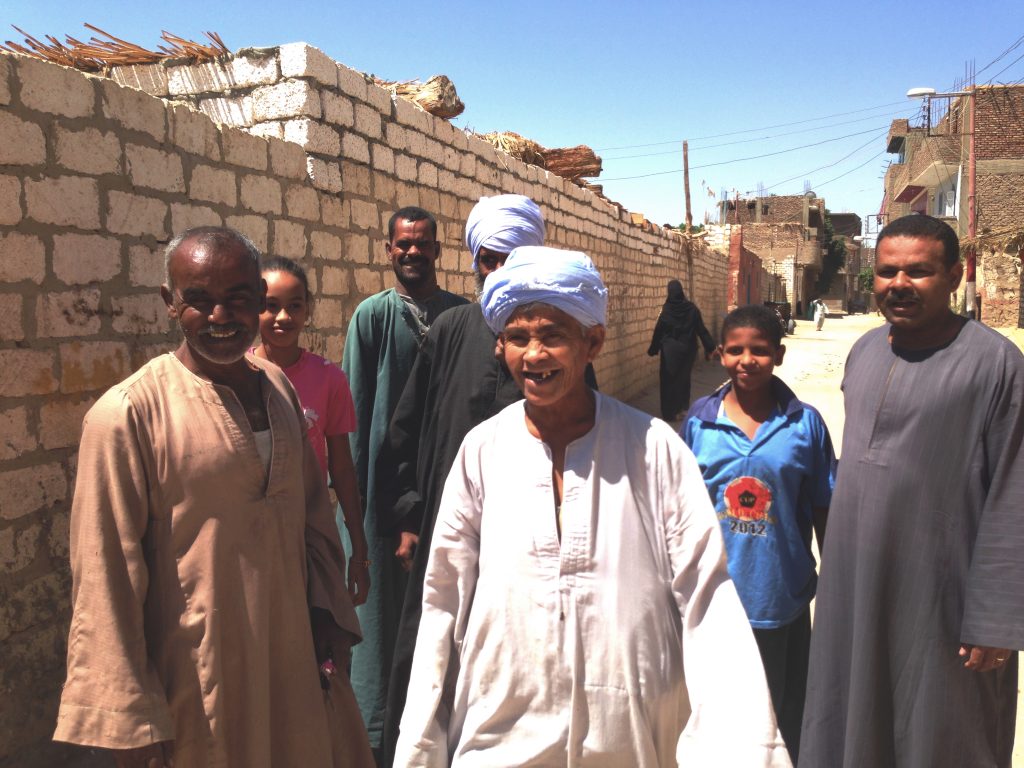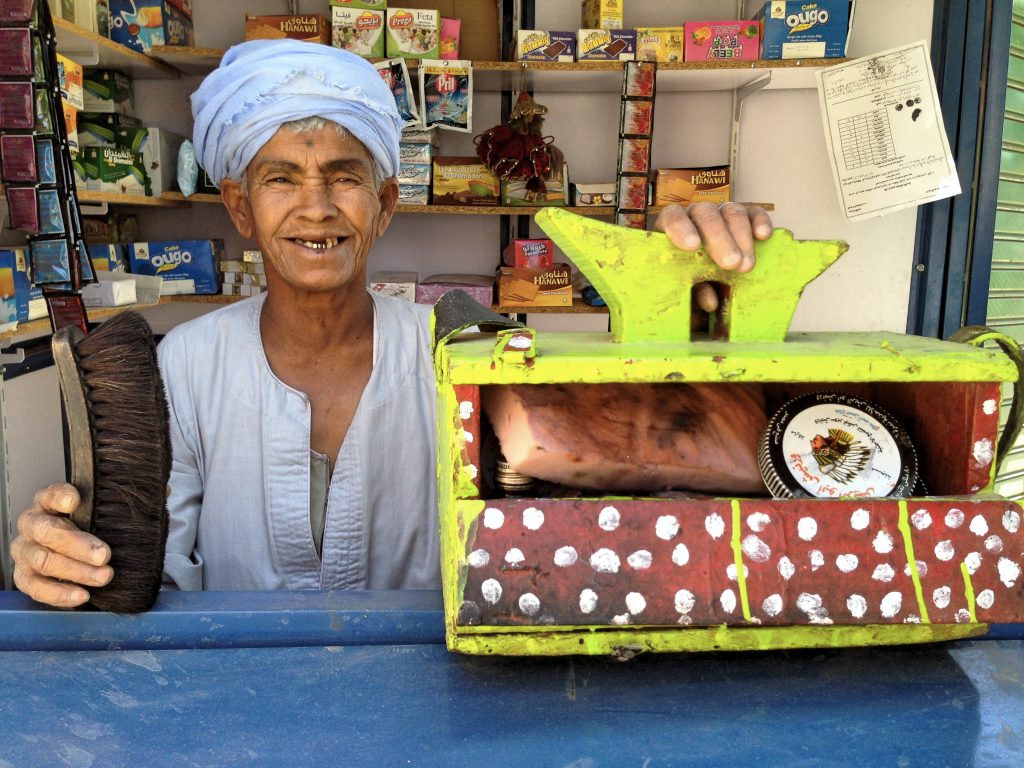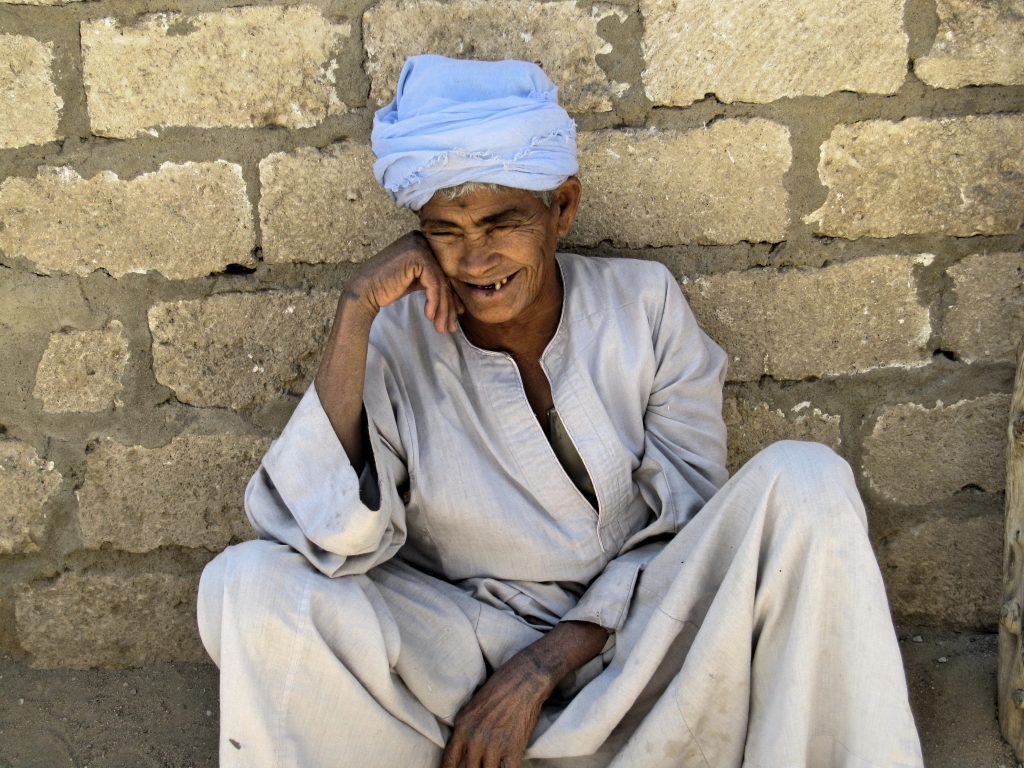Luxor, Egypt — Her house is little more than a nude brick building. It has three floors and an open roof that could have been converted into a pleasant terrace, but she never had enough money to carry out the renovation. The bathroom is a tiny room that looks more like a pantry, with a low ceiling that obliges those who use it to remain crouched, and consists of nothing but a hole and a metal basin. The kitchen is just a double-butane stove set in the middle of the living room and beside the bed, with a bowl and nearby tap serving as the improvised sink in which she washes her two plates and few tea cups.
As she kisses her right hand, she repeats: “Alhamdulillah, alhamdulillah” (Thanks be to God).
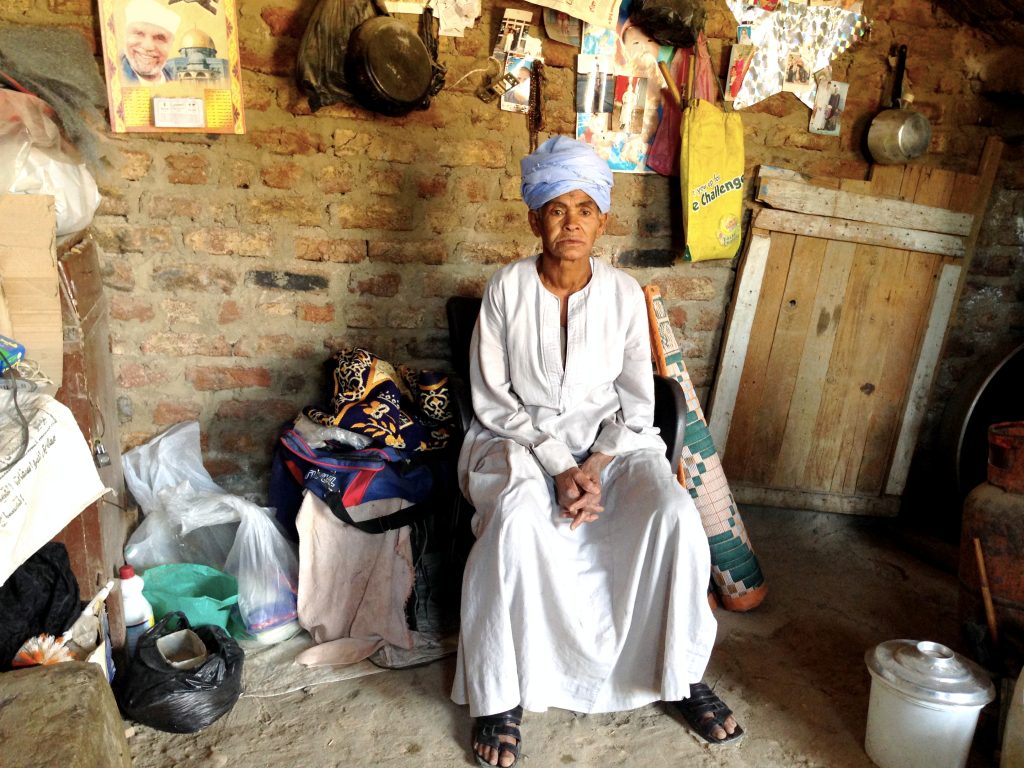
Sisa Abu Daooh at home. She spent the last 43 years dressed as a man to make ends meet for her and her daughter.
This is the story of a poor Egyptian woman’s fight to survive. She is just one of millions of impoverished Egyptian women who make up 26% — around 22 million — of Egypt’s population living in abject poverty, as was recently reported by the Egyptian Central Agency for Public Mobilization and Statistics (CAPMAS). Sisa Abu Daooh, however, stands out among these masses. She is a model of self-sacrifice, a woman who has done the remarkable to enable her family to survive. For the past 43 years, Daooh has disguised herself as a man and worked among them to make ends meet.
As a teenager in Upper Egypt, Daooh could not have possibly predicted the daily struggle her life would become. Born in a small village near Luxor in 1950, she was raised traditionally and married so young that she cannot recall how old she was when the marriage took place. The union was happy but, unfortunately, short-lived. Soon after the wedding, and about six months into her pregnancy, the young bride’s husband died. It is a milestone that continues to mark her, and one that she recalls as she cradles a photo of her husband close to her heart.
“Suddenly I was alone and living with a newborn baby. My brothers wanted me to remarry, but I refused because I wanted to protect my daughter.” Her reluctance was not only based out of loyalty to her late husband, but also in line with her rural region’s traditional culture, in which it would not have been acceptable for a girl to be raised within the house of a man who was not her father. Had Daooh remarried, her daughter would likely have been sent away to live with her paternal family, completely removed from her mother’s range.
For this reason, despite the vulnerability into which she was thrust after her husband’s death, Daooh repeatedly rejected the suitors who called upon her. Her decision cannot have been taken lightly. According to the World Bank’s Egyptian inequality book, which features national statistics based on household incomes, expenditure and consumption surveys showed that between 22% and 25% of all Egyptians in 2008/9 and 2010/11, respectively, lived below the poverty line. Slightly less than 7% and 5% of the populations in the 2008/9 and 2010/11 surveys, respectively, were considered to be ultra poor, that is, living below the food poverty line. In Egypt, poverty is largely a rural phenomenon, and a particularly significant one in Upper Egypt, where Daooh lives — a region in which 44% of residents live below the poverty line.
CAPMAS reported last year that 49% of people in Upper Egypt cannot meet basic food needs, and the 13.2% unemployment rate nearly doubles to 24.2% when women are singled out. Malnutrition is up, with 31% of children under 5 years of age suffering growth stunts, as opposed to 23% in 2005, according to CAPMAS. A 2011 United Nations World Health Organization report estimated that in nine governorates, just over half of children under five were believed to have anemia, which the agency classified as a “severe public health problem.”
Lack of education further hinders the population’s ability to access better living conditions. The Egyptian Authority for Educating Adults calculated that 21.7% of the region’s population was illiterate as of July 2014, with 28.5% of all females classified as illiterate, compared with 15% of males. Among all Egyptian regions, Upper Egypt has the greatest number of illiterate citizens.
Daooh is part of this larger statistic, a fact that is evident as she stands with some newspapers in which her story has been reported recently. She asks me to take a photo of her with the pages featuring her name in the headlines, but hesitates. She moves the pages vertically and horizontally. “Which way should I hold the pages?” she asks.
A recent study by Save the Children concluded that among the 179 worst countries in which to be a mother, Egypt is No. 76. It is within this context that Daooh was recently spotlighted by none other than President Abdel-Fattah el-Sissi, who awarded her the “Best Mother” award in March. The prize led to Daooh’s newfound celebrity in Luxor, where local women call out to her as she wanders her neighborhood. “Haga Sisa!, Haga Sisa!” they shout, smiling, addressing her with a term traditionally used to address older women who have carried out a sacred duty to travel to Makkah for the Hajj pilgrimage.
Since she was spotlighted by the national government, Daooh has garnered a great deal of international attention, and a local journalist is managing her increasingly busy media agenda. Despite her celebrity, Daooh still lives in abject poverty, a fact the journalist is quick to point out when I visit. “The whole matter has surprised me; I am used to seeing her everyday, and I did not expect her to be the focus of a story,” the journalist explains. “Perhaps you might consider giving her some money, a donation. You’ll see when you drop by her house … She really has nothing.”
I meet Daooh early the following morning, at 7 a.m. She has already been up for quite a while, a common practice in a stifling city like Luxor, where the sun already burns at 11 a.m., and where temperatures regularly reach 113º F. Small, thin, with wrinkled brown skin, Egypt’s “Best Mother” shakes my hand firmly before inviting me inside her house. We sit upon her bed — the only place available — while she makes tea. Noticing her scraping at the sugar tin, I offer to take my tea without, but she quickly jumps up to show me a bag in which she has two more packets of sugar. “I have more, I have a lot,” she declares proudly, as if showing off a treasure. Because to Daooh, this sugar really is prized. Food is a scarce commodity here, stored in her “fridge” — a clay jar — or in dishcloths, like the bread that she kisses before wrapping it to keep it safe from flies.
“I am very clean, I wash up immediately after eating … I do not like the flies.”
Daooh looks fragile, but she talks with the strong, firm, masculine voice of a superhero. To a certain extent, she very much is one. Widowed and tending to a newborn baby in a place where working women were not socially accepted, Daooh opted to disguise herself as a man to look for work and earn the money needed to get by.
“I would do everything for my daughter.” Indeed, even now, she continues to maintain her child. “Her husband is ill and cannot work, so I am giving them whatever money I can contribute and paying her rent.”
Daooh’s first jobs were in construction, making bricks. The tools she used back then still hang on the walls of her kitchen/living room/bedroom. She smacks her legs as she recalls this period of intense manual labor, showing remarkable strength despite her age. “I spent a long time carrying heavy things! I am still strong! If I hit you like this, I’ll knock you out!” she declares, laughing.
Egypt’s “Best Mother” has a great sense of humor and jokes frequently. Once, when we were alone in a room, she says, “Do not worry to be alone with me, do not be afraid, I am woman like you,” then pulls her right breast out of the galabiya (her masculine disguise) to show me that she actually is a woman.
Making bricks was exhausting work, and Daooh eventually moved on to other less taxing activities. For a time she worked harvesting wheat. Later, when her strength began to fade, she moved on to shoe shining. “A Christian man allowed me to sit down in front of his shop and there I stayed for many years.”
During the course of our interview, several neighbors dropped by, and Daooh chatted with them for a while. “Are they your friends?” I ask afterward. “No, I do not have friends, only Allah,” she answers. Even when she is smiling, her eyes show signs of fatigue and distrust, the consequence of a complicated life full of hardship, a puzzle that is missing many pieces. She was married for such a short while that she has little in common with other married women. She doesn’t fit in with her community, neither with the women because she dresses like a man to work, and not with the men because, despite her disguise, she is still a woman. And yet she has survived in this harsh environment, driven to provide for her daughter and supported only by her shoe-shining box.
From behind, Daooh looks like a man. After so many years, she moves like them, and it sometimes takes a moment’s thought to remember that she is a woman. She has never lied about her sex, instead opting to demonstrate her worth by working just as intensely as her male peers. Over the years, her voice grew gruff and she adopted their mannerisms. “With the galabiya, they do not look at me as a woman, and no one bothers me.”
Even today she is uncomfortable when she is not wearing her galabiya. After receiving the award from el-Sissi, she was interviewed in a TV show. She came dressed in women’s clothes and complained bitterly throughout the program. Despite her discomfort, the program was a step in improving her lot in life, its producers intervening to get the governor of Luxor to provide her with a snack-selling kiosk, a way in which to more or less guarantee some earnings. Daooh’s kiosk is in a good location near the bus station. The governor gave it to her with a full stock of products, as she could not have possibly afforded to stock the stand on her own.
She is proud of her new stake but is still wary. She keeps her shoe-shining box nearby, just in case. Daooh says she is happy but her life is still incomplete. “When I met el-Sissi, I was shy to ask him for an apartment,” she says. “If you can reach him, tell him that I want a house to live with my daughter and grandsons. Please tell him.”
After visiting the kiosk, we come back to her home. Time to eat: bread with honey. Afterward, she washes herself and prays in her room, where the walls are decorated with pictures. Most are of her and her daughter Huda, but there is also one of her with a young foreign man. She kisses it. She does not remember the man’s name, but he apparently knew of her circumstances and helped her many years ago.
This is Daooh’s life, one lived out dressed as a man to make the means with which to protect her child. “I will dress this way until the day I die, and I will not allow people to judge me, only God.” Islam does not allow people of one gender to dress as those of the opposite gender, but Islam also contemplates every action in the context of its intention, and it is clear that this woman has dressed as a man to aid her daughter.
“Young Egyptian women can see me as an example,” she says. “They know what I have done. And my galabiya is a symbol, a tool that has let me gain everything I have ever had.”
START SLIDESHOW

Sisa Abu Daooh’s house in Luxor, Egypt is little more than a nude brick building. It has three floors and an open roof.

The bathroom is a tiny room that looks more like a pantry, with a low ceiling that obliges those who use it to remain crouched, and consists of nothing but a hole and a metal basin.

The kitchen is just a double-butane stove set in the middle of the living room and beside the bed, with a bowl and nearby tap serving as the improvised sink in which she washes her two plates and few tea cups.

Daooh was married so young, she can’t remember how old she was. Although it was a happy marriage, it was short-lived. Six months into her pregnancy, her husband died.

Since Daooh received the president’s award, she’s become a sort of local celebrity. Local women call out to her as she wanders the neighborhood. “Haga Sisa! Haga Sisa!”

Daooh sits down to eat bread and honey. Her small room houses everything she needs on a daily basis.
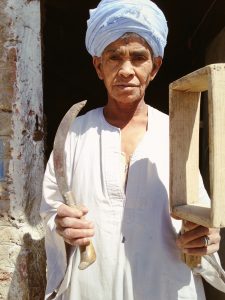
Daooh’s first job as a “man” was in making bricks, an exhaustive task. Later she harvested wheat, a less taxing job.

Her eyes show signs of fatigue and distrust, the consequence of a complicated life full of hardship, a puzzle that is missing many pieces.

Daooh naturally moves and sits like a man, after so many years of dressing like one. “With the galabiya, they do not look at me as a woman, and no one bothers me.”
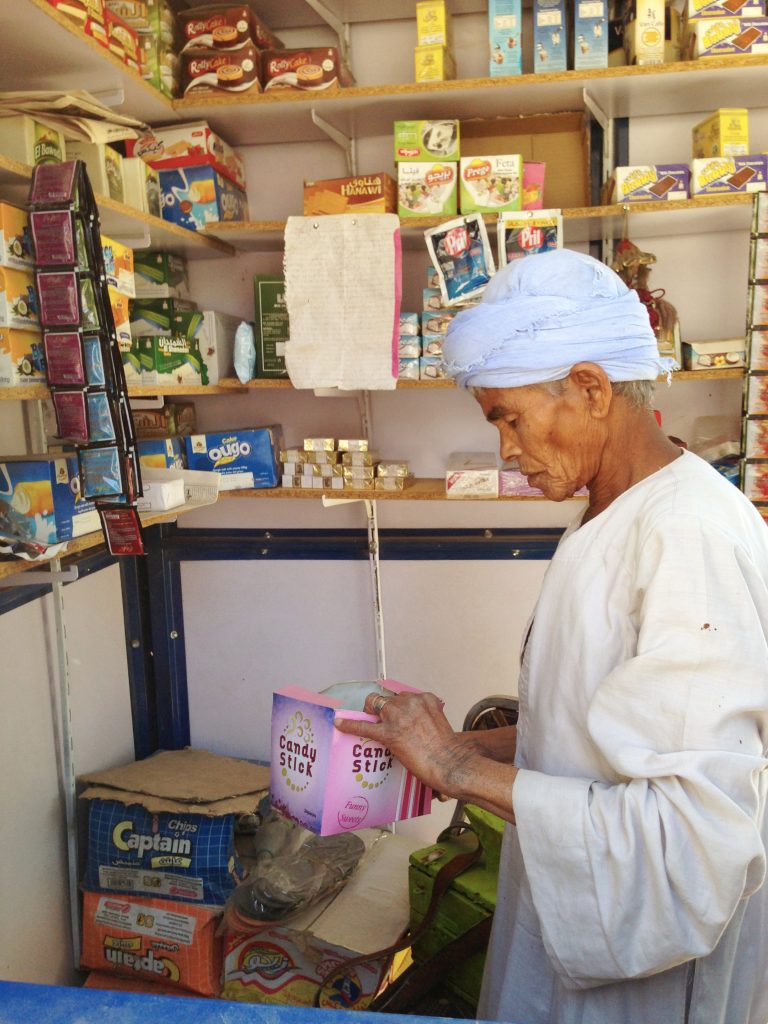
The governor of Luxor provided Daooh with a snack-selling kiosk as a way to guarantee some earnings.

The governor gave her the kiosk already stocked full of products, something that would have been impossible for her to afford on her own.

Daooh’s wall has photos, including of her daughter and one of a foreign man who once helped her many years ago after learning of her circumstances.
This article originally appeared in the Spring/Summer 2015 print issue of The Islamic Monthly.




